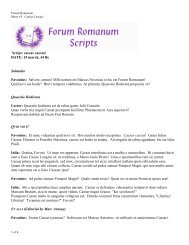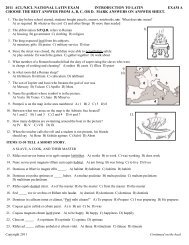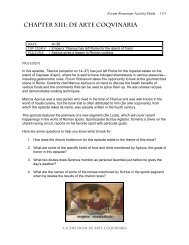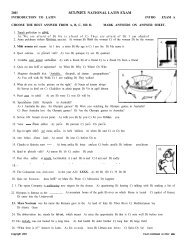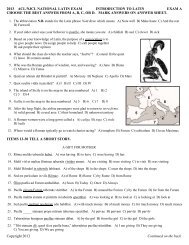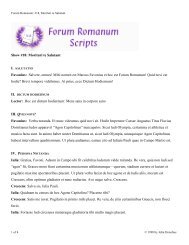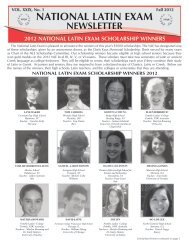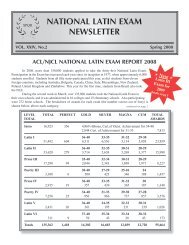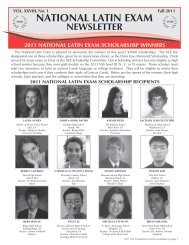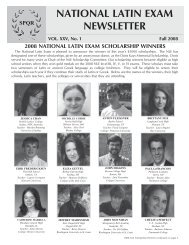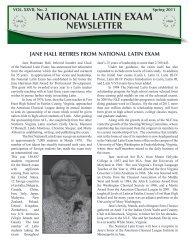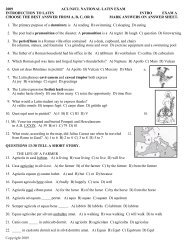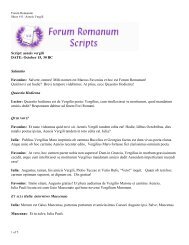The HARD Ones and the EASY Ones: 2010 - The National Latin Exam
The HARD Ones and the EASY Ones: 2010 - The National Latin Exam
The HARD Ones and the EASY Ones: 2010 - The National Latin Exam
You also want an ePaper? Increase the reach of your titles
YUMPU automatically turns print PDFs into web optimized ePapers that Google loves.
Hard: 23. Which <strong>Latin</strong> motto could well accompany an official warning? A) Ab ovo usque ad mala<br />
B) Hard: Dum 23. spiro Which spero <strong>Latin</strong> C) Amor motto omnia could well vincit accompany D) Verbum an sapienti official warning? sat est (28% A) knew Ab ovo that usque D is <strong>the</strong> ad mala correct<br />
B) Dum spiro spero C) Amor omnia vincit D) Verbum sapienti sat est (28% knew that D is <strong>the</strong> correct<br />
answer.) Dum spiro spero C) Amor omnia vincit D) Verbum sapienti sat est (28% knew that D is <strong>the</strong> correct<br />
answer.)<br />
LATIN II cont.<br />
answer.)<br />
Easy: 25. Who was Odysseus’ wife who waited twenty years for his return from <strong>the</strong> Trojan War?<br />
Easy: 25. Who was Odysseus’ wife who waited twenty years for his return from <strong>the</strong> Trojan War?<br />
A) Easy: Circe 25. B) Who Penelope was Odysseus’ C) Medea wife D) who Eurydic waited (78% twenty knew years that for B his is <strong>the</strong> return correct from answer.) <strong>the</strong> Trojan War?<br />
A) Circe B) Penelope C) Medea D) Eurydic (78% knew that B is <strong>the</strong> correct answer.)<br />
LATIN III<br />
LATIN III<br />
Grammar Questions<br />
Grammar Questions<br />
Hard: 8. Apud nōs omnēs bene cēnant. A) At our house B) On account of us C) Among ours D) For us<br />
Hard: 8. Apud nōs omnēs bene cēnant. A) At our house B) On account of us C) Among ours D) For us<br />
(26% knew 8. Apud that nōs A is omnēs <strong>the</strong> correct bene answer.) cēnant. A) At our house B) On account of us C) Among ours D) For us<br />
(26% knew that A is <strong>the</strong> correct answer.)<br />
Easy: 6. Pater fīliīs imperāvit nē ad flūmen īrent. A) <strong>The</strong> sons told <strong>the</strong>ir fa<strong>the</strong>r to go to <strong>the</strong> river. B) <strong>The</strong> fa<strong>the</strong>r<br />
Easy: 6. Pater fīliīs imperāvit nē ad flūmen īrent. A) <strong>The</strong> sons told <strong>the</strong>ir fa<strong>the</strong>r to go to <strong>the</strong> river. B) <strong>The</strong> fa<strong>the</strong>r<br />
ordered 6. his Pater sons fīliīs not to imperāvit go to <strong>the</strong> nē river. ad flūmen C) <strong>The</strong> īrent. fa<strong>the</strong>r A) was <strong>The</strong> not sons comm<strong>and</strong>ed told <strong>the</strong>ir fa<strong>the</strong>r to go with to go his to sons <strong>the</strong> river. to <strong>the</strong> B) river. <strong>The</strong> fa<strong>the</strong>r<br />
ordered his sons not to go to <strong>the</strong> river. C) <strong>The</strong> fa<strong>the</strong>r was not comm<strong>and</strong>ed to go with his sons to <strong>the</strong> river.<br />
D) ordered D) <strong>The</strong> fa<strong>the</strong>r his sons did not not to ask go his to <strong>the</strong> sons river. to leave C) <strong>The</strong> <strong>the</strong> river. fa<strong>the</strong>r (89% was not knew comm<strong>and</strong>ed that B is <strong>the</strong> to go correct with his answer.) sons to <strong>the</strong> river.<br />
D) <strong>The</strong> fa<strong>the</strong>r did not ask his sons to leave <strong>the</strong> river. (89% knew that B is <strong>the</strong> correct answer.)<br />
O<strong>the</strong>r Questions<br />
Hard: 20. An ancient Roman discussing conclāmātiō, O<strong>the</strong>r Questions rogus, imāginēs, toga pulla, <strong>and</strong> laudātiō would most<br />
Hard: 20. An ancient Roman discussing conclāmātiō, rogus, imāginēs, toga pulla, <strong>and</strong> laudātiō would most<br />
likely Hard: be 20. speaking An ancient of a Roman A) funeral discussing B) wedding conclāmātiō, C) coming rogus, of imāginēs, age ceremony toga pulla, D) birthday <strong>and</strong> laudātiō would most<br />
likely be speaking of a A) funeral B) wedding C) coming of age ceremony D) birthday<br />
(13% likely knew be speaking that A of is <strong>the</strong> a A) correct funeral answer.) B) wedding C) coming of age ceremony D) birthday<br />
(13% knew that A is <strong>the</strong> correct answer.)<br />
Easy: 23. According to its <strong>Latin</strong> root, agenda means things A) to be remembered B) to find C) to be done<br />
Easy: 23. According to its <strong>Latin</strong> root, agenda means things A) to be remembered B) to find C) to be done<br />
D) to list 23. (71% According knew that to its C <strong>Latin</strong> is <strong>the</strong> root, correct agenda answer.) means things A) to be remembered B) to find C) to be done<br />
D) to list (71% knew that C is <strong>the</strong> correct answer.)<br />
PROSE III AND IV<br />
PROSE III AND IV IV<br />
Grammar Questions<br />
Grammar Questions<br />
Hard: 8. Semper contrā hostēs _____ ūsus sum. A) clēmentia B) clēmentiae C) clēmentium D) clēmentiā<br />
Hard: 8. Semper contrā hostēs _____ ūsus sum. A) clēmentia B) clēmentiae C) clēmentium D) clēmentiā<br />
(31% knew 8. Semper that D contrā is <strong>the</strong> correct hostēs _____ answer.) ūsus sum. A) clēmentia B) clēmentiae C) clēmentium D) clēmentiā<br />
(31% knew that D is <strong>the</strong> correct answer.)<br />
Easy: 10. Mārcus Antōnius in Forō crās ōrātiōnem habēbit. A) will stop <strong>the</strong> speech B) will give a speech<br />
Easy: 10. Mārcus Antōnius in Forō crās ōrātiōnem habēbit. A) will stop <strong>the</strong> speech B) will give a speech<br />
C) Easy: will 10. avoid Mārcus <strong>the</strong> speech Antōnius D) in will Forō hear crās a speech ōrātiōnem (89% habēbit. knew that A) B will is <strong>the</strong> stop correct <strong>the</strong> speech answer.) B) will give a speech<br />
C) will avoid <strong>the</strong> speech D) will hear a speech (89% knew that B is <strong>the</strong> correct answer.)<br />
O<strong>the</strong>r Questions<br />
O<strong>the</strong>r Questions<br />
Hard: 20. Bithynia, Pontus, <strong>and</strong> Cilicia were Roman provinces located in A) Hispania B) Africa C) Asia<br />
D)<br />
Hard:<br />
Gallia<br />
20.<br />
(26%<br />
Bithynia,<br />
knew<br />
Pontus,<br />
that C<br />
<strong>and</strong><br />
is <strong>the</strong><br />
Cilicia<br />
correct<br />
were<br />
answer.)<br />
Roman provinces located in A) Hispania B) Africa C) Asia<br />
D) Gallia (26% knew that C is <strong>the</strong> correct answer.)<br />
D) Gallia (26% knew that C is <strong>the</strong> correct answer.)<br />
Easy: 28. What is <strong>the</strong> term for <strong>the</strong> mythological creature that is half-man <strong>and</strong> half-horse? A) satyr B) griffin<br />
C)<br />
Easy:<br />
centaur<br />
28. What<br />
D) triton<br />
is <strong>the</strong><br />
(88%<br />
term<br />
knew<br />
for <strong>the</strong><br />
that<br />
mythological<br />
C is <strong>the</strong> correct<br />
creature<br />
answer.)<br />
that is half-man <strong>and</strong> half-horse? A) satyr B) griffin<br />
C) centaur D) triton (88% knew that C is <strong>the</strong> correct answer.)<br />
C) centaur D) triton (88% knew that C is <strong>the</strong> correct answer.)<br />
POETRY III AND IV<br />
POETRY III AND IV<br />
Grammar Questions<br />
Grammar Questions<br />
Hard: 5. Hic ōrātor saepe spērābat mīrificē sē locūtum esse. A) that he was speaking B) that he would speak<br />
C)<br />
Hard:<br />
that<br />
5.<br />
he<br />
Hic<br />
had<br />
ōrātor<br />
spoken<br />
saepe<br />
D) that<br />
spērābat<br />
he was<br />
mīrificē<br />
speaking<br />
sē locūtum<br />
to himself<br />
esse.<br />
(32%<br />
A)<br />
knew<br />
that he<br />
that<br />
was<br />
C<br />
speaking<br />
is <strong>the</strong> correct<br />
B) that<br />
C) that he had spoken D) that he was speaking to himself (32% knew that C is <strong>the</strong> correct answer.)<br />
he would speak<br />
answer.)<br />
C) that he had spoken D) that he was speaking to himself (32% knew that C is <strong>the</strong> correct answer.)<br />
Easy: 11. Cēdāmus Phoebō et meliōra sequāmur. A) better things B) <strong>the</strong> greatest things C) more things<br />
D)<br />
Easy:<br />
D) <strong>the</strong><br />
11.<br />
<strong>the</strong> most<br />
Cēdāmus<br />
most important<br />
Phoebō<br />
important things<br />
et<br />
things (82%<br />
meliōra<br />
(82% knew<br />
sequāmur.<br />
knew that A is <strong>the</strong><br />
A) better<br />
<strong>the</strong> correct<br />
things<br />
correct answer.)<br />
B) <strong>the</strong> greatest things C) more things<br />
answer.)<br />
D) <strong>the</strong> most important things (82% knew that A is <strong>the</strong> correct answer.)<br />
O<strong>the</strong>r Questions<br />
Hard: 26. Ubinam gentium sunt Bīthynia, Pontus, O<strong>the</strong>r et Phrygia? Questions A) in Eurōpā B) in Galliā C) in Germāniā<br />
D)<br />
Hard:<br />
D) in Asiā<br />
26. Ubinam<br />
Asiā (45% knew<br />
gentium<br />
knew that D<br />
sunt<br />
D is <strong>the</strong><br />
Bīthynia,<br />
<strong>the</strong> correct<br />
Pontus,<br />
correct answer.)<br />
et Phrygia? A) in Eurōpā B) in Galliā C) in Germāniā<br />
answer.)<br />
D) in Asiā (45% knew that D is <strong>the</strong> correct answer.)<br />
Easy: 20. A ferrous compound contains A) lead B) gold C) silver D) iron<br />
(87%<br />
Easy:<br />
(87% knew<br />
20. A<br />
knew that<br />
ferrous<br />
that D is<br />
compound<br />
is <strong>the</strong> correct<br />
contains<br />
correct answer.)<br />
A) lead B) gold C) silver D) iron<br />
answer.)<br />
(87% knew that D is <strong>the</strong> correct answer.)<br />
7



